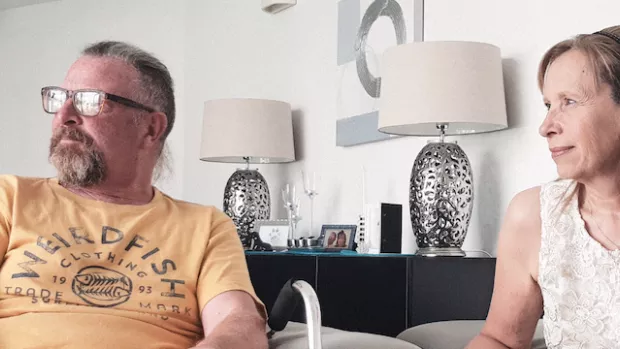
Care and support for advanced MS
If you‘ve got advanced MS it really helps if health care is coordinated by a multi-disciplinary team. That’s a team with lots of different skills. Your neurologist and MS nurse can be a source of support and have information about specialist services that are available, including advance care planning.
Read the latest information about care and support and coronavirus COVID-19
The different specialists will help make sure complex symptoms are managed well and prevent complications.
Find out more about:
Care at home
Living with advanced MS can be very complicated for everyone involved, including family and carers.
It’s essential that everyone has the support they need from the services available.
A complete care package should take care of physical and mental health. It should also give practical support, including help with finances.
Find out more in ourcare servicessection.
Healthcare services
Advanced MS doesn’t mean ‘nothing more can be done’, or that contact with health care services should drop off. If your MS is advanced, you might want be in touch with them more often, not less.
Official guidelines say, no matter what stage your MS, you should get a once a year review with an MS specialist. This might not be a neurologist. It could be an MS nurse. This review is to check in with you about all aspects of your medical care.
You shouldn’t feel you only have your GP to turn to. For help with symptoms there are a range of specialists you can ask your GP or MS nurse to refer you to.
Palliative care
Many people think palliative care is about making people comfortable who are close to dying. But it’s also for people in the advanced stage of a condition who aren't close to death at all.
Palliative care can help someone have a better quality of life and enjoy life as best as they can. For example, palliative care can manage symptoms like pain. More and more people severely affected by MS are taking advantage of palliative care
Sometimes the support will be through a palliative care team, sometimes through specialists in other teams. In reality, not everyone finds they can access all the specialists they need, but that shouldn’t stop you from pushing for what's available in your area. Ask for a referral from your GP or another specialist you are seeing, such as an MS nurse or neurologist.
Community based services provide support in your home and can also be a great help to people severely affected by MS. These may include district nurses, health visitors and community matrons. GPs can also provide regular health checks.
If you have any problems in getting health services, the local Patient Advice and Liaison Services (often known as ‘PALS’ for short) may be able to help.
In Scotland, the local PASS (Patient Advice and Support Service) may be able to help.
Continuing health care
In England, Wales and Northern Ireland, some people who need very complicated medical care at their home or in a care home might qualify for 'continuing health care' (CHC). This is sometimes called fully-funded NHS care. This care is provided by the NHS, so you’re not charged for it.
Social care
Social care is a particularly important source of practical help to you and unpaid carers. It could provide:
- gadgets, aids and adaptations to the home
- personal care services to help with daily tasks and needs
- day care, respite care or residential care
Find out more on our social care pages.
Respite care
Respite care is short-term complete care designed to give both carers and people with advanced MS a break from the usual routine of caring and being cared for.
We can support you to plan a holiday or short break as respite care.
Find out more about our MS short breaks service
Long-term residential care
Sometimes it becomes difficult to cope at home with very complex care needs.
For some people, longer term residential care is needed, either temporary or permanent.
This can be an extremely distressing and difficult decision, and it can help a great deal to have appropriate information to hand.
Financial support
MS can have a big impact on your money situation. It's worth checking what financial help is available for people with MS and carers.
Find out more about benefits and other savings you might be entitled to
Maintaining quality of life
If you’re living with advanced MS, it can be much harder to keep up interests and social connections. But if you, family and friends can find ways to adapt, it can make a big difference to your quality of life.
You might find ways to continue with social networks and interests you already have, or find new ones that better suit your changing lifestyle.
Adaptations and technology sometimes make hobbies easier – independent living centres and other independent living organisations like AbilityNet can help you find options.
Days out might need practical planning, but local organisations can sometimes help, with activities to give you and your carer a break.
Day care centres also often have activities, open up new social networks, and provide care on site. Your local MS Society group will often know what’s available in your area.
Looking after your social life can keep you connected to relationships outside your immediate family and carers. Connections can help prevent feelings of isolation and depression.
The impact on others
Living with advanced MS can have an impact on relationships with partners, children and friends. Some people say that the changing dynamics of care and support make it harder to have a romantic relationship.
And some parents with MS find it hard if they turn to their children for help in meeting daily needs.
Quality of life matters for you and your loved ones. Although lots of family members and friends find it easy to adjust to caring, others find the responsibility brings physical stresses and emotional strains. It's important to make sure everyone is getting the support they need from all the services they can.
Unpaid carers are entitled to their own social care assessment. And if things change, you and your carer can ask for a review of the care you get.
Planning ahead for the care you want
Everyone has the right to make choices about the care they receive now and in the future. Planning well in advance makes sure your wishes can be taken into account. There are legal and practical ways to do this, by using:
- a power of attorney
- an advance decision (to refuse treatment). Also known as a 'living will' or, in Scotland, an 'advance directive'. If you stop breathing and don't want to be resuscitated, that can be recorded here
- an advance statement
- a will
Find out more about planning ahead for the care you want.





